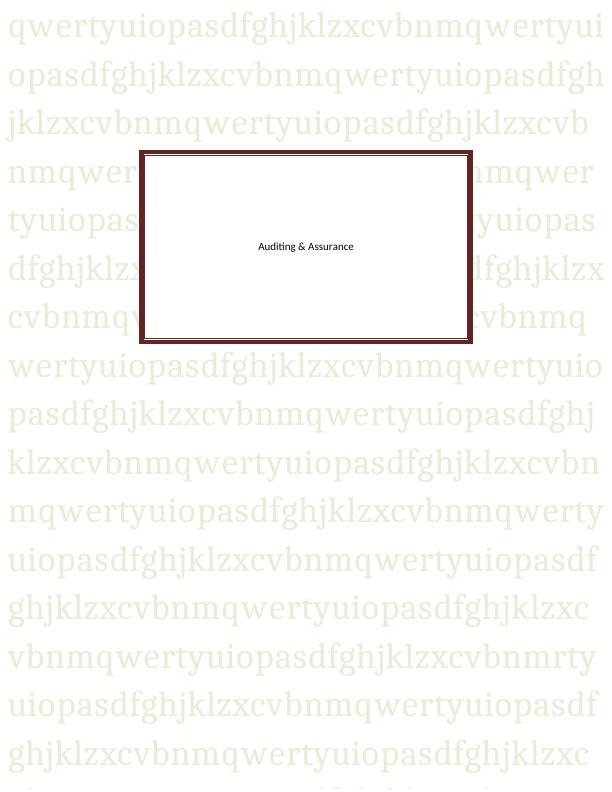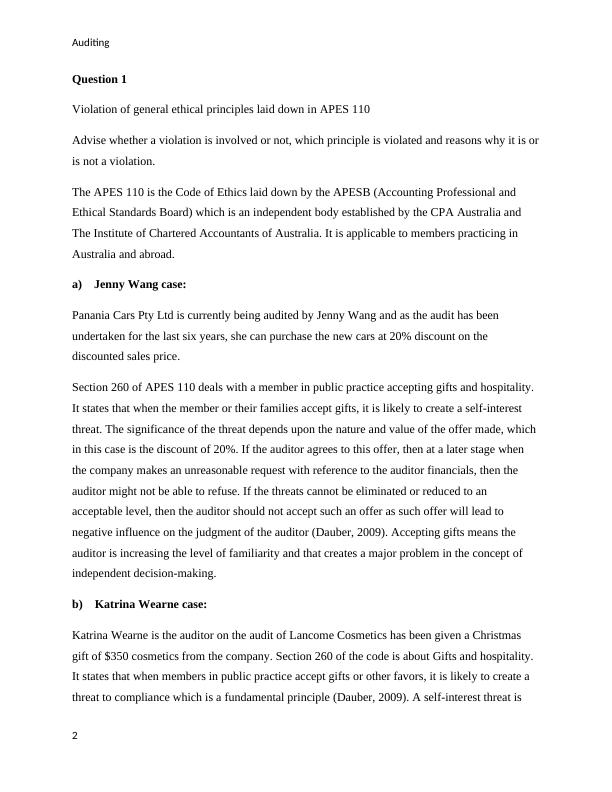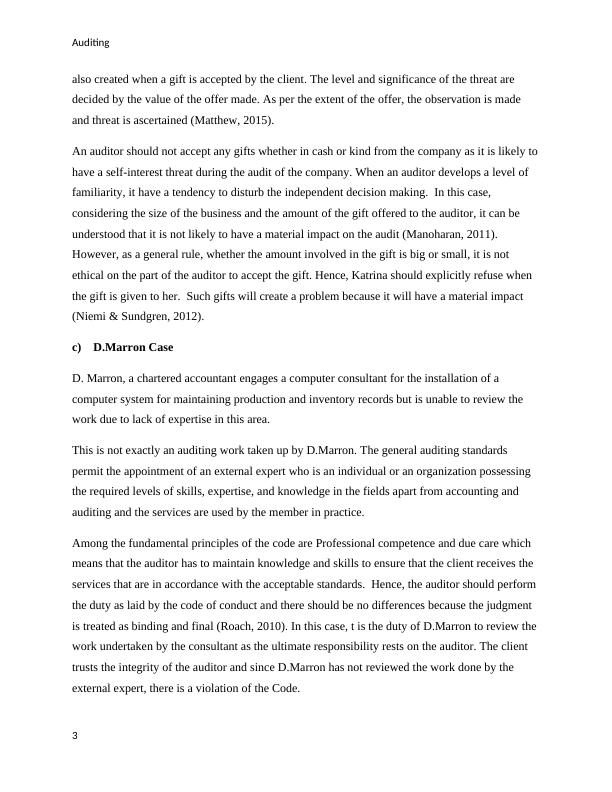APES 110 Violations and Threats to Auditor Independence
Added on 2023-06-12
10 Pages2614 Words75 Views
qwertyuiopasdfghjklzxcvbnmqwertyui
opasdfghjklzxcvbnmqwertyuiopasdfgh
jklzxcvbnmqwertyuiopasdfghjklzxcvb
nmqwertyuiopasdfghjklzxcvbnmqwer
tyuiopasdfghjklzxcvbnmqwertyuiopas
dfghjklzxcvbnmqwertyuiopasdfghjklzx
cvbnmqwertyuiopasdfghjklzxcvbnmq
wertyuiopasdfghjklzxcvbnmqwertyuio
pasdfghjklzxcvbnmqwertyuiopasdfghj
klzxcvbnmqwertyuiopasdfghjklzxcvbn
mqwertyuiopasdfghjklzxcvbnmqwerty
uiopasdfghjklzxcvbnmqwertyuiopasdf
ghjklzxcvbnmqwertyuiopasdfghjklzxc
vbnmqwertyuiopasdfghjklzxcvbnmrty
uiopasdfghjklzxcvbnmqwertyuiopasdf
ghjklzxcvbnmqwertyuiopasdfghjklzxc
Auditing & Assurance
opasdfghjklzxcvbnmqwertyuiopasdfgh
jklzxcvbnmqwertyuiopasdfghjklzxcvb
nmqwertyuiopasdfghjklzxcvbnmqwer
tyuiopasdfghjklzxcvbnmqwertyuiopas
dfghjklzxcvbnmqwertyuiopasdfghjklzx
cvbnmqwertyuiopasdfghjklzxcvbnmq
wertyuiopasdfghjklzxcvbnmqwertyuio
pasdfghjklzxcvbnmqwertyuiopasdfghj
klzxcvbnmqwertyuiopasdfghjklzxcvbn
mqwertyuiopasdfghjklzxcvbnmqwerty
uiopasdfghjklzxcvbnmqwertyuiopasdf
ghjklzxcvbnmqwertyuiopasdfghjklzxc
vbnmqwertyuiopasdfghjklzxcvbnmrty
uiopasdfghjklzxcvbnmqwertyuiopasdf
ghjklzxcvbnmqwertyuiopasdfghjklzxc
Auditing & Assurance

Auditing
Question 1
Violation of general ethical principles laid down in APES 110
Advise whether a violation is involved or not, which principle is violated and reasons why it is or
is not a violation.
The APES 110 is the Code of Ethics laid down by the APESB (Accounting Professional and
Ethical Standards Board) which is an independent body established by the CPA Australia and
The Institute of Chartered Accountants of Australia. It is applicable to members practicing in
Australia and abroad.
a) Jenny Wang case:
Panania Cars Pty Ltd is currently being audited by Jenny Wang and as the audit has been
undertaken for the last six years, she can purchase the new cars at 20% discount on the
discounted sales price.
Section 260 of APES 110 deals with a member in public practice accepting gifts and hospitality.
It states that when the member or their families accept gifts, it is likely to create a self-interest
threat. The significance of the threat depends upon the nature and value of the offer made, which
in this case is the discount of 20%. If the auditor agrees to this offer, then at a later stage when
the company makes an unreasonable request with reference to the auditor financials, then the
auditor might not be able to refuse. If the threats cannot be eliminated or reduced to an
acceptable level, then the auditor should not accept such an offer as such offer will lead to
negative influence on the judgment of the auditor (Dauber, 2009). Accepting gifts means the
auditor is increasing the level of familiarity and that creates a major problem in the concept of
independent decision-making.
b) Katrina Wearne case:
Katrina Wearne is the auditor on the audit of Lancome Cosmetics has been given a Christmas
gift of $350 cosmetics from the company. Section 260 of the code is about Gifts and hospitality.
It states that when members in public practice accept gifts or other favors, it is likely to create a
threat to compliance which is a fundamental principle (Dauber, 2009). A self-interest threat is
2
Question 1
Violation of general ethical principles laid down in APES 110
Advise whether a violation is involved or not, which principle is violated and reasons why it is or
is not a violation.
The APES 110 is the Code of Ethics laid down by the APESB (Accounting Professional and
Ethical Standards Board) which is an independent body established by the CPA Australia and
The Institute of Chartered Accountants of Australia. It is applicable to members practicing in
Australia and abroad.
a) Jenny Wang case:
Panania Cars Pty Ltd is currently being audited by Jenny Wang and as the audit has been
undertaken for the last six years, she can purchase the new cars at 20% discount on the
discounted sales price.
Section 260 of APES 110 deals with a member in public practice accepting gifts and hospitality.
It states that when the member or their families accept gifts, it is likely to create a self-interest
threat. The significance of the threat depends upon the nature and value of the offer made, which
in this case is the discount of 20%. If the auditor agrees to this offer, then at a later stage when
the company makes an unreasonable request with reference to the auditor financials, then the
auditor might not be able to refuse. If the threats cannot be eliminated or reduced to an
acceptable level, then the auditor should not accept such an offer as such offer will lead to
negative influence on the judgment of the auditor (Dauber, 2009). Accepting gifts means the
auditor is increasing the level of familiarity and that creates a major problem in the concept of
independent decision-making.
b) Katrina Wearne case:
Katrina Wearne is the auditor on the audit of Lancome Cosmetics has been given a Christmas
gift of $350 cosmetics from the company. Section 260 of the code is about Gifts and hospitality.
It states that when members in public practice accept gifts or other favors, it is likely to create a
threat to compliance which is a fundamental principle (Dauber, 2009). A self-interest threat is
2

Auditing
also created when a gift is accepted by the client. The level and significance of the threat are
decided by the value of the offer made. As per the extent of the offer, the observation is made
and threat is ascertained (Matthew, 2015).
An auditor should not accept any gifts whether in cash or kind from the company as it is likely to
have a self-interest threat during the audit of the company. When an auditor develops a level of
familiarity, it have a tendency to disturb the independent decision making. In this case,
considering the size of the business and the amount of the gift offered to the auditor, it can be
understood that it is not likely to have a material impact on the audit (Manoharan, 2011).
However, as a general rule, whether the amount involved in the gift is big or small, it is not
ethical on the part of the auditor to accept the gift. Hence, Katrina should explicitly refuse when
the gift is given to her. Such gifts will create a problem because it will have a material impact
(Niemi & Sundgren, 2012).
c) D.Marron Case
D. Marron, a chartered accountant engages a computer consultant for the installation of a
computer system for maintaining production and inventory records but is unable to review the
work due to lack of expertise in this area.
This is not exactly an auditing work taken up by D.Marron. The general auditing standards
permit the appointment of an external expert who is an individual or an organization possessing
the required levels of skills, expertise, and knowledge in the fields apart from accounting and
auditing and the services are used by the member in practice.
Among the fundamental principles of the code are Professional competence and due care which
means that the auditor has to maintain knowledge and skills to ensure that the client receives the
services that are in accordance with the acceptable standards. Hence, the auditor should perform
the duty as laid by the code of conduct and there should be no differences because the judgment
is treated as binding and final (Roach, 2010). In this case, t is the duty of D.Marron to review the
work undertaken by the consultant as the ultimate responsibility rests on the auditor. The client
trusts the integrity of the auditor and since D.Marron has not reviewed the work done by the
external expert, there is a violation of the Code.
3
also created when a gift is accepted by the client. The level and significance of the threat are
decided by the value of the offer made. As per the extent of the offer, the observation is made
and threat is ascertained (Matthew, 2015).
An auditor should not accept any gifts whether in cash or kind from the company as it is likely to
have a self-interest threat during the audit of the company. When an auditor develops a level of
familiarity, it have a tendency to disturb the independent decision making. In this case,
considering the size of the business and the amount of the gift offered to the auditor, it can be
understood that it is not likely to have a material impact on the audit (Manoharan, 2011).
However, as a general rule, whether the amount involved in the gift is big or small, it is not
ethical on the part of the auditor to accept the gift. Hence, Katrina should explicitly refuse when
the gift is given to her. Such gifts will create a problem because it will have a material impact
(Niemi & Sundgren, 2012).
c) D.Marron Case
D. Marron, a chartered accountant engages a computer consultant for the installation of a
computer system for maintaining production and inventory records but is unable to review the
work due to lack of expertise in this area.
This is not exactly an auditing work taken up by D.Marron. The general auditing standards
permit the appointment of an external expert who is an individual or an organization possessing
the required levels of skills, expertise, and knowledge in the fields apart from accounting and
auditing and the services are used by the member in practice.
Among the fundamental principles of the code are Professional competence and due care which
means that the auditor has to maintain knowledge and skills to ensure that the client receives the
services that are in accordance with the acceptable standards. Hence, the auditor should perform
the duty as laid by the code of conduct and there should be no differences because the judgment
is treated as binding and final (Roach, 2010). In this case, t is the duty of D.Marron to review the
work undertaken by the consultant as the ultimate responsibility rests on the auditor. The client
trusts the integrity of the auditor and since D.Marron has not reviewed the work done by the
external expert, there is a violation of the Code.
3

End of preview
Want to access all the pages? Upload your documents or become a member.
Related Documents
APES 110: Code of Ethics for Accounting Professionalslg...
|7
|2263
|315
Auditing and Assurance Services (pdf)lg...
|11
|2857
|180
Auditing and Assurance Services: Ethical Principles and Violationslg...
|10
|2671
|476
Auditing Theory and Practicelg...
|10
|2385
|347
Auditing and Assurance Services: Compliance with APES Standardslg...
|9
|1508
|141
Commentary on Ethical Principles in Auditinglg...
|9
|2154
|415
